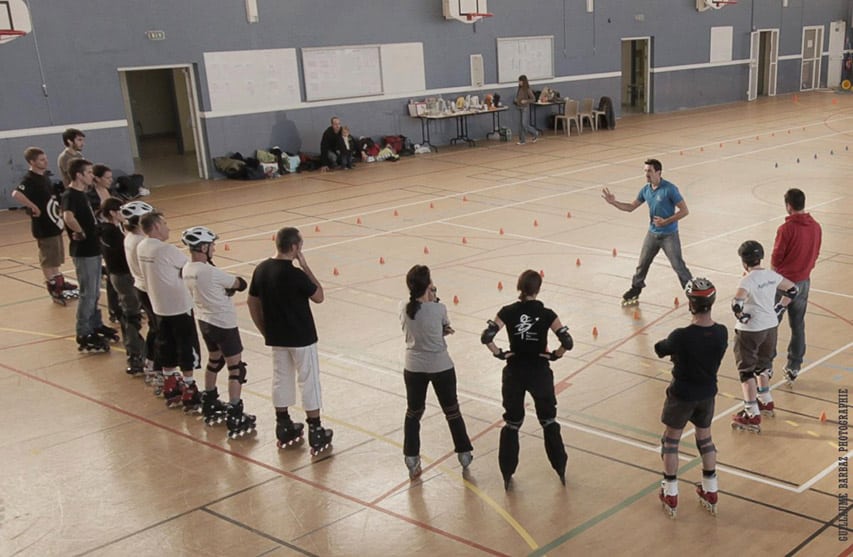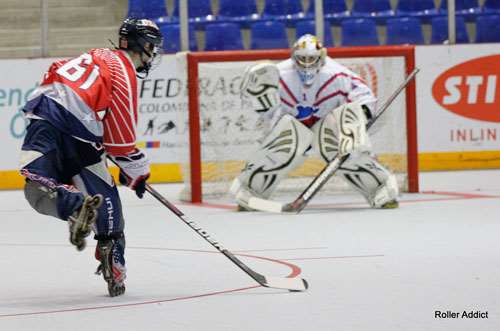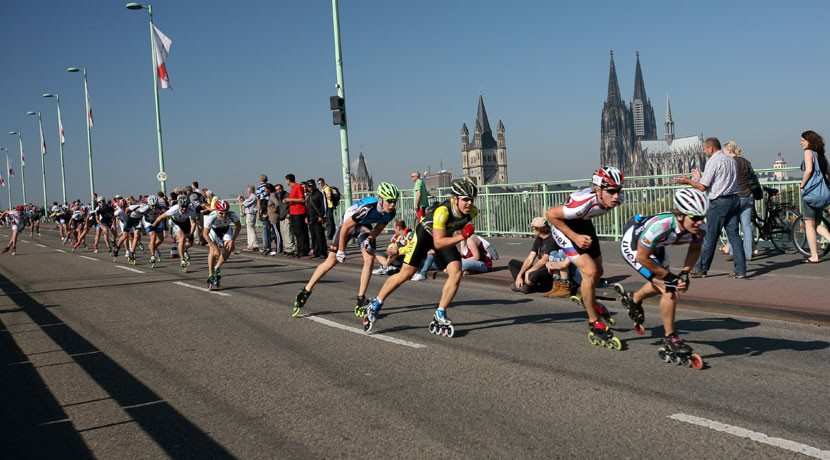Practising skating indoors: How useful?
Par alfathor |
Publié le 17 July 2014 |
Mis à jour le 3 November 2020 |
Catégories :
All
All
| Sous-catégories :
Practising skating indoors
learning skating indoors
indoor skating
| 21259
| Tags :
Practising skating indoors
learning skating indoors
indoor skating
Learning how to skate often happens indoors, in a venue reserved by your club. That environment has undeniable advantages at first, but can prove to have limitations quickly if you don’t use your imagination…
The advantages of indoors skate practice

The hall or the gym: A stable and safe environment to start with
All the specialists of motor learning will tell you that there’s nothing better than a stable environment for your learning to unfold in the best conditions.
 If you are a beginner, all your attention is monopolized by the handling of your skates. So that you don’t pay much attention to everything around: obstacles, cars, various users, ground changes… Too much information arrives to your brain at the same time and you aren’t able to sort them out and discern the relevant pieces. That’s a huge risk you take!
If you are a beginner, all your attention is monopolized by the handling of your skates. So that you don’t pay much attention to everything around: obstacles, cars, various users, ground changes… Too much information arrives to your brain at the same time and you aren’t able to sort them out and discern the relevant pieces. That’s a huge risk you take!
Indoors, the weather is stable, the ground is homogeneous, there are but a few rare obstacles, there’s not much bustle around (usually).
All in all, it is the ideal place to start in good conditions.
Training whatever the weather
Let’s be honest, unless you live in the South, weather is so variable that you can’t plan a training without having a dry backup place at least! Training indoors is strategical. Skaters can go on with their winter preparation indoors and make the most of it in working on their technique, especially in speed skating for example.
You can also complete your winter preparation in going to a gym studio.
An environment that can be modulated for improvement
If you are part of a club and attend classes with an instructor, he or she will modulated the space to offer drills that will enable you to improve. In order to improve, difficulty should be optimal (adapted to your level), not maximal (unreachable at your level). An optimal task is hard to do, but the goal is reachable with perseverance.
Many means are at the instructor’s disposal:
- cones to slalom around
- bars to go under or over
- hard mats to simulate a change of surface
- situations with a great number of skaters in organized or non-coordinated motion
- lines on the floor to be used
- small jump modules
That process works for beginners as well as for more experienced and expert skaters. In modulating the environment you are in, you create new situations forcing you to set up new motor skills. Your senses are stimulated and you develop new skills… or refine them.
The limitations of indoors practice
A hall is not a street
 There are situations that can’t be recreated indoors, such as changes of weather and surfaces, or unexpected obstacles. That’s why, when you have acquired a good skating level, it is essential that you confront yourself to the changes and variables of the urban environment. How will you pass a drain seal or a pavement if you’ve never been confronted with them? Don’t forget that skating is above all an urban sport, finding its essence on the asphalt.
There are situations that can’t be recreated indoors, such as changes of weather and surfaces, or unexpected obstacles. That’s why, when you have acquired a good skating level, it is essential that you confront yourself to the changes and variables of the urban environment. How will you pass a drain seal or a pavement if you’ve never been confronted with them? Don’t forget that skating is above all an urban sport, finding its essence on the asphalt.
Developing new motor skills
Obviously it all depends on your objectives. If you practice an indoor sport like artistic or hockey skating, you won’t necessarily feel the need to skate outside… And you’ll miss the opportunity of widening your range of motor skills!
Skating is a plural practice. The more varied situations you meet, the more motor skills and tools you’ll have have to answer to any situation: going under a branch, passing tramway rails, skating backwards because somebody will have jostled you, jumping a crack, skating on damaged grounds… All those situations request skills that will be useful in most skating disciplines: balance, jumping, weight shifting, bending…
Useful links
– Our section dedicated to the learning of skating
Photos: Guillaume Barbaz (Skali)
Roller Addict, Cologne Marathon
Translation: Chloe Seyres
